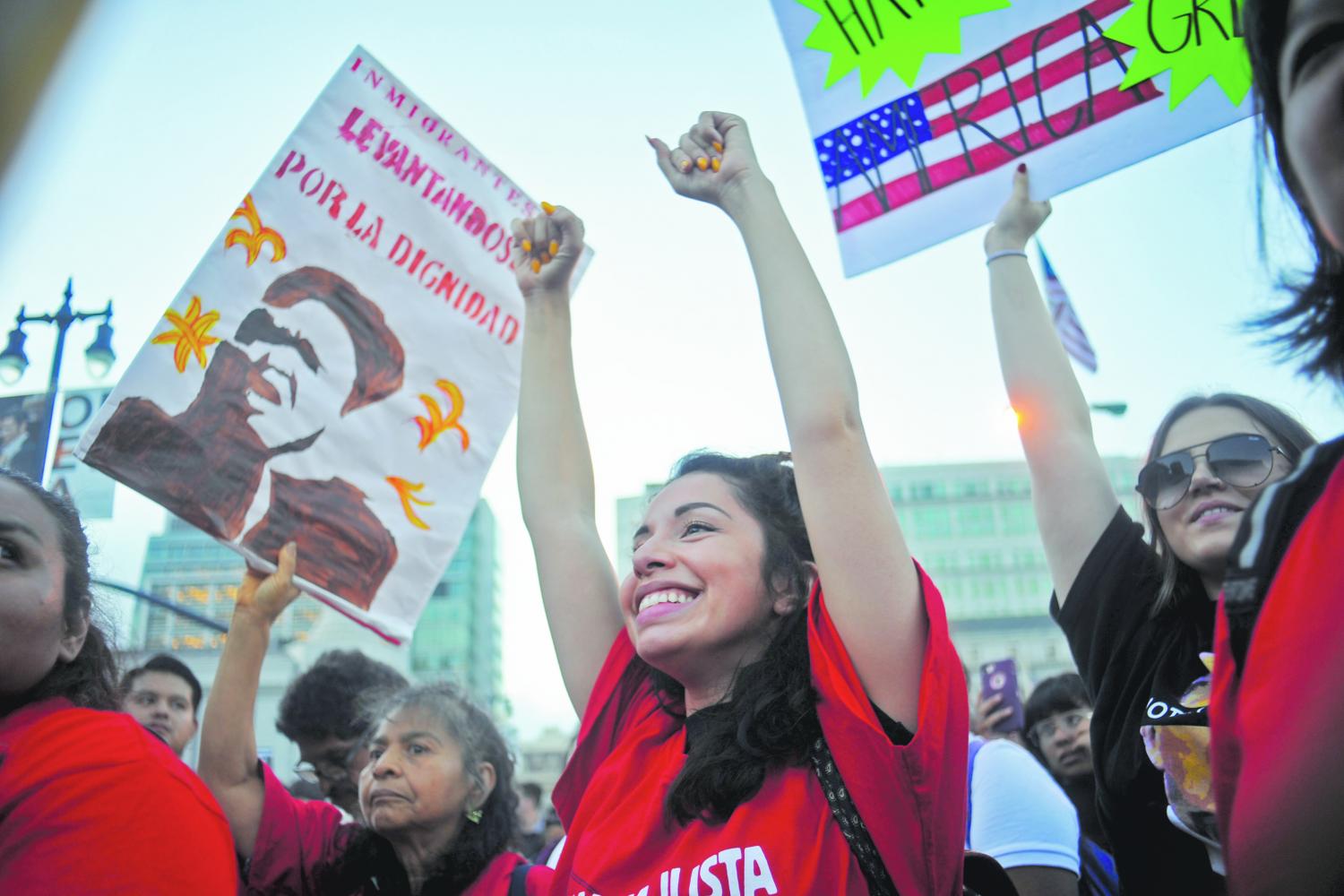DACA repeal reinvigorates movement
Oakland resident Yesenia Veamatahau holds her fists in the air as a speaker performs an empowering poem during the closing rally of an impromptu march to City Hall in San Francisco on Sept. 6.
Sep 15, 2017
President Donald Trump continued his assault on policies put forth by the Obama administration Tuesday when, through Attorney General Jeff Sessions, he announced the cancellation of the Deferred Action for Childhood Arrival program (DACA).
The program, which served as a temporary safety net for roughly 800,000 children of immigrants has been a target of immigration opponents since its inception in June of 2012.
In a lengthy press conference Sept. 5 announcing the administration’s legal basis for rolling back the program, the attorney general cited the unilateral passage of the program by the Obama administration and the loss of hundreds of thousands of jobs to potentially hard working Americans as his impetus for killing the plan.
“To have a lawful system of immigration, that serves the national interest, we cannot admit everyone that would like to come here,” Sessions said in a Tuesday press conference from the Department of Justice in Washington D.C.
The thousands of people receiving DACA had no choice in coming to the U.S. and have to prove through an extensive biometric qualification process that they were minors and had no say as to when and where they arrived here.
Those qualifying had to have been under age 31on June 15, 2012 and came to the U.S. while under age16.
Aside from paying nearly $500 in application and processing fees, recipients cannot have been convicted of a felony or a serious misdemeanour and also must have a high school diploma or equivalent — among other things.
However, even when meeting the requirements, there is no guarantee that an applicant will be accepted into the program.
Rather than abruptly ending the stop-gap reform, the Trump administration has instead given the program a 6-month window to allow the U.S. Congress time to construct and pass some version of a comprehensive immigration reform package.
Trump, who was noticeably silent on his administration’s immigration announcement prior to Session’s Tuesday press conference levied his executive direction by tweet at 5:38 p.m. that same evening.
“Congress now has 6 months to legalize DACA (something the Obama Administration was unable to do). If they can’t, I will revisit this issue!” Trump tweeted.
The 6-month window, ending March 6, puts people up for DACA renewal in a precarious position.
According to the Department of Homeland Security’s online DACA processing update, individuals who have not submitted an application by Sept. 5 for an initial request under DACA may no longer apply.
For those looking to renew, the situation is more complicated.
In a memo detailing the rescinding of DACA by acting Secretary of Homeland Security Elaine Duke, she states the department “will adjudicate — on an individual, case by case basis — properly filed pending DACA renewal requests and associated applications for Employment Authorization Documents from current beneficiaries that have been accepted by the Department as of the date of this memorandum, and from current beneficiaries whose benefits will expire between the date of this memorandum and March 5, 2018 that have been accepted by the Department as of October 5, 2017.”
Meaning, if a person’s DACA status expires after Oct. 5, their renewal before the March 5 termination date will not be accepted.
“I just renewed so I have two years left,” economics major Oscar Martinez said. “Being instilled with the fear that you may be separated from your family is overwhelming.”
After the announcement, protests in support of the popular and successful program erupted into the streets of major cities across the country — including San Francisco.
Maribel Sanchez, who attended the impromptu action in San Francisco, knows people put into harm’s way by the ruling.
“I have family and friends who are directly affected and I am here to use my voice to do what’s right, the government does not have to take people away who have been working here for years.” she said.
The DACA program boasts a wealth of success stories outlined in a first-of-its kind survey of recipients covering the years 2013-14 by UC San Diego assistant professor Tom Wong and Carolina Valdevia, a student at Harvard University.
It found 70 percent of respondents began their first job or moved to a new job upon receiving deferred action while 46 percent say that DACA has enabled them to become more financially independent.
As demeaning as is is to reduce the value of people to their economic worth, DACA recipients pay into social security, spend the majority of their income on taxable goods and contribute to the growth of the Gross Domestic Product (GDP) simply by being employed.
Expelling 800,00 productive people is simply bad for the economy.
More importantly, 64 percent say that they are no longer afraid because of their immigration status and 35% report becoming more involved in their communities.
84 percent now have their driver’s license or state identification card 20 percent report buying their first car while 23 percent report a return to school.
Many DACA students have reaquainted themselves with that uncomfortable feeling of facing a future governed by uncertainty.
“We stand in support of our undocumented students. Other than the pain that I feel with all of you, I want to express how supported you are at CCC,” Contra Costa College President Mojdeh Mehdizadeh said to a handful of DACA students at a campus forum on Wednesday.
“The college leadership doesn’t believe that it is OK to sit back and have this happen to us.
It’s absolutely not what we stand for as educators. It’s painful, but we have to persevere.”
Mehdizadeh was born in Iran and was brought to the U.S. by her parents at age 8 in search of a better future for her and her siblings.
Aside from Mehdizadeh expressing her solidarity, Jacob Knapp, acting general counsel for the California Community College District issued a memorandum, which can be read at contracosta.edu, fortifying the district’s support for undocumented students.
In states that are sympathetic to the plight of members of immigrant communities, legislation may already be enacted to assure a pathway to education — regardless of citizenship status.
In California, Assembly Bill 540 (AB 540), a 16-year-old bill signed by then governor Gray Davis provides undocumented students with the ability to attain a college education by ensuring that they pay in-state tuition instead of out-of-state tuition.
Even if DACA is fully rescinded, Calif. Students will be able to attend school and even have their tuition paid if they qualify for state assistance like the Board of Governors fee waiver (BOG grant).
Anyone as openly targeted by the government as DACA recipients have the right to feel a heightened sense of vulnerability. Part of the registration process requires applicants to submit all of the information about their living arrangements potentially exposing loved ones to enhanced scrutiny by law enforcement.
At CCC, Police Services says they will continue to make the school a sanctuary for undocumented students without the threat of immigration officials storming the campus and checking papers.
In the days following the Trump administration’s announcement, Lieutenant Tom Holt made sure he and other officers were visible and inviting to reassure students and faculty that there were no departmental policy shifts in line with DACA’s repeal.
“Other than what the chancellor and the president (Mehdizadeh) already set out, we just want to be transparent,” Holt said. “We want them to know that we are there for them just like when there were immigration concerns at the beginning of the year.”
“We’re not going to be asking people for their immigration status.”



